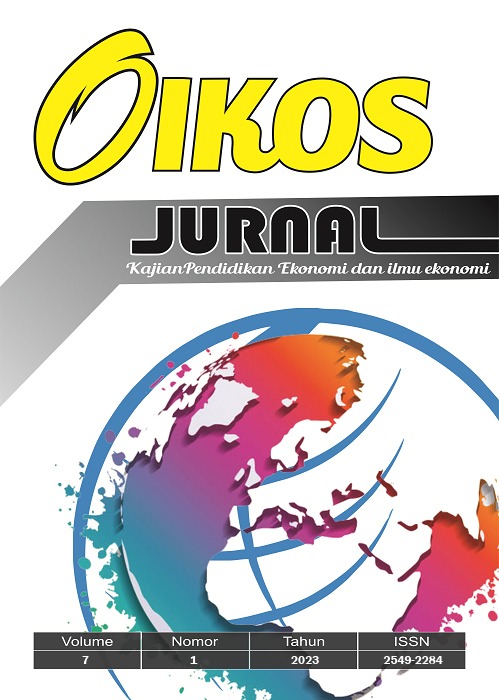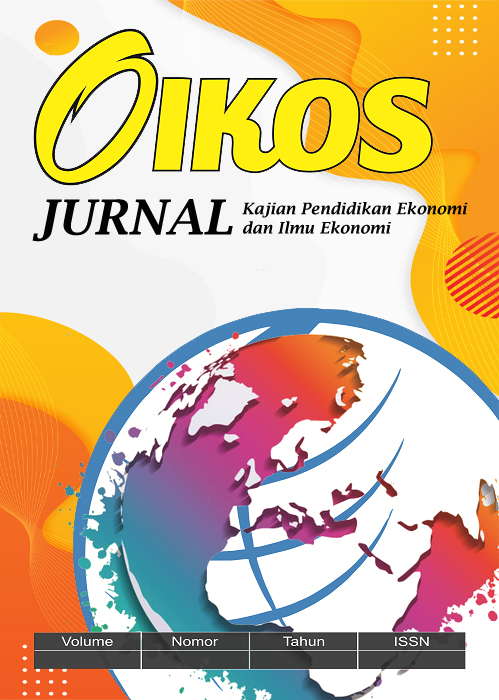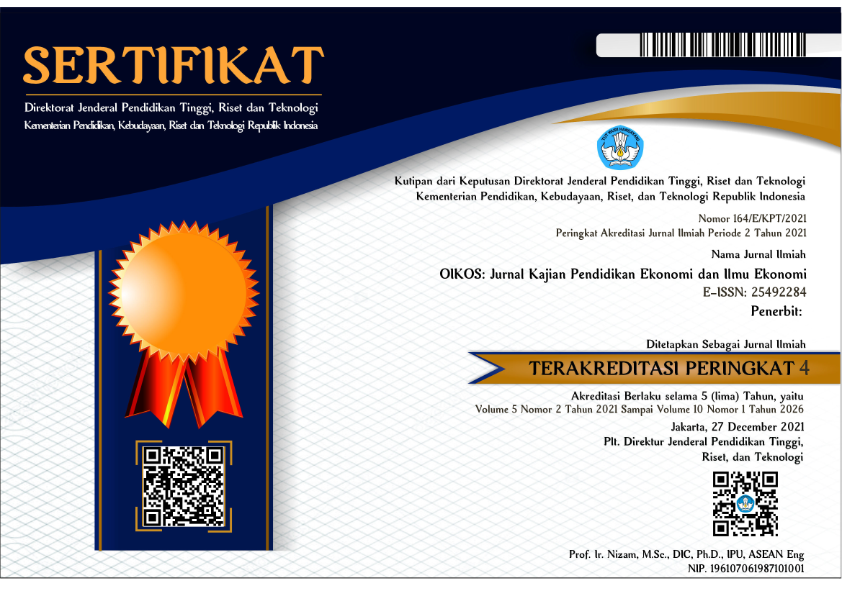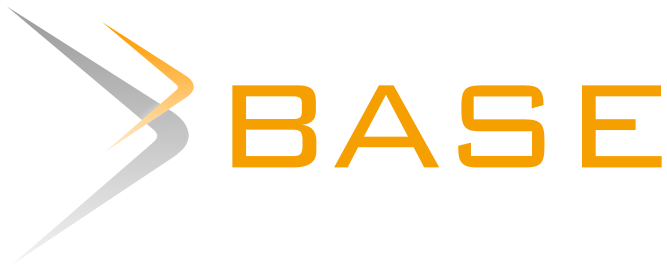INFLUENCE OF ENTREPRENEURSHIP EDUCATION, NEED FOR ACHIEVEMENT, AND INTERNAL LOCUS OF CONTROL ON ENTREPRENEURIAL INTEREST OF STUDENTS SMK NEGERI 1 SUKOHARJO
DOI:
https://doi.org/10.23969/oikos.v7i1.6229Keywords:
entrepreneurial interest, entrepreneurship education, need for achievement, internal locus of controlAbstract
The research objective to be achieved in this study is to determine the effect of the variables of entrepreneurship education, need for achievement, and internal locus of control on entrepreneurial interest. This research is a quantitative study with a population of 358 students and a sample of 189 in class XII students of SMKN 1 Sukoharjo from proffesional competences, namely Online Business and Marketing, Accounting and Financial Institutions, Automatication of Office Management, and Computer and Network Engineering. Proportionate random sampling is a technique used in sampling. Data were collected using a Likert scale with a closed questionnaire and using multiple regression analysis for data analysis. The results showed that there was a simultaneous or partial influence of the variables of entrepreneurship education, need for achievement, and internal locus of control on entrepreneurial interest. Adjusted R square has a value of 0.673 which shows that 67.3% entrepreneurial interest is influenced by entrepreneurship education, need for achievement, and internal locus of control and the remaining 32.7% is influenced by other variables. This shows that the relationship of entrepreneurial interest with the three independent variables is very strong because the value is greater than 0.50. Results sffective contribution to entrepreneurship education is 46.2%, need for achievement is 8.8%, and internal locus of control is 12.9% towards entrepreneurial interest.
Downloads
References
Afifah, S. H. (2015). Pengaruh need for achievement dan locus of control terhadap intensi berwirausaha siswa SMK Negeri 1 Surakarta. (Tesis, Universitas Sebelas Maret, Surakarta).
Ajzen, I. (2005). Attitudes, Personality And Behavior (Second Edi). New York: Open University Press.
Apriana, H., Yuliani, T., & Nur’aini, T. A. (2019). Pengaruh Pendidikan Kewirausahaan Dan Kepribadian Terhadap Minat Berwirausaha Siswa Kelas XI SMK Negeri 4 Balikpapan Tahun Ajaran 2017/2018. Jurnal Edueco Universitas Balikpapan, 2(1), 26–33.
Badan Pusat Statistik. (2017). Hasil Pendaftaran Usaha/ Perusahaan Sensus Ekonomi 2016 Indonesia. Jakarta: Badan Pusat Statistik.
Badan Pusat Statistik. (2020). Keadaan Ketenagakerjaan Indonesia Agustus 2020. Jakarta: Badan Pusat Statistik.
Badan Pusat Statistik. (2021). Hasil Sensus Penduduk 2020. Jakarta: Badan Pusat Statistik.
Dewi, S. K. S. (2017). Konsep dan Pengembangan Kewirausahaan di Indonesia. Yogyakarta: Deepublish.
Embi, N. A. C., Jaiyeoba, H. B., & Yussof, S. A. (2019). The effects of students ’ entrepreneurial characteristics on their propensity to become entrepreneurs in Malaysia. Education+Training, 1–15. https://doi.org/10.1108/ET-11-2018-0229
Ermawati, N., Soesilowati, E., & Prasetyo, P. E. (2017). Pengaruh Need for Achivment Dan Locus of Control Terhadap Intensi Berwirausaha Melalui Sikap Siswa Kelas XII SMK Negeri Se Kota Semarang. Journal of Economic Education, 6(1), 66–74. https://doi.org/10.15294/jeec.v6i1.14704
Hajrah, Siswoyo, B. B., & Rahayu, W. P. (2016). Effect of Entrepreneurial Education and Economic Conditionof Parents towards an Entrepreneurship Attitudes through the Entrepreneurship Interest. IOSR Journal of Business and Management (IOSR-JBM), 18(6), 105–110. https://doi.org/10.9790/487X-180601105110
Herlambang, T. (2018). Analisis internal dan external terhadap minat berwirausaha. Jurnal Penelitian Ipteks, 3(1), 44–56.
Hermawan, R. W., Soetjipto, B. E., & Rahayu, W. P. (2016). The Effect of Entrepreneurial Self-Efficacy and Locus of Control on Entrepreneurship Interest through Entrepreneurship Literacy. IOSR Journal of Business and Management (IOSR-JBM), 18(2), 141–148. https://doi.org/10.9790/487X-1821141148
Indarti, N., Rostiani, R., & Nastiti, T. (2010). Underlying Factors of Entrepreneurial Intentions among Asian Students. The South East Asian Journal of Management, 4(2), 143–159. https://doi.org/10.21002/seam.v4i2.5636
Iwu, C. G., Opute, P. A., Nchu, R., Eresia-Eke, C., Tengeh, R. K., Jaiyeoba, O., & Aliyu, O. A. (2019). Entrepreneurship education, curriculum and lecturer-competency as antecedents of student entrepreneurial intention. International Journal of Management Education, 19(1), 1–13. https://doi.org/10.1016/j.ijme.2019.03.007
Karabulut, A. T. (2016). Personality Traits on Entrepreneurial Intention. Procedia - Social and Behavioral Sciences, 229, 12–21. https://doi.org/10.1016/j.sbspro.2016.07.109
Karimi, S., Biemans, H. J. A., Lans, T., Chizari, M., & Mulder, M. (2014). The Impact of Entreprenenurship Education: Iranian Students’ Entrepreneurial Intentions and Opportunity Identification. Journal of Small Business Management, 1–23. https://doi.org/10.1111/jsbm.12137
Karimi, S., Biemans, H. J. A., Naderi Mahdei, K., Lans, T., Chizari, M., & Mulder, M. (2017). Testing the relationship between personality characteristics, contextual factors and entrepreneurial intentions in a developing country. International Journal of Psychology, 52(3), 227–240. https://doi.org/10.1002/ijop.12209
Kementerian Pendidikan dan Kebudayaan. (2018). Kemdikbud Dorong SMK Ciptakan Wirausaha Muda. Diperoleh 20 April 2020, dari. https://www.kemdikbud.go.id/main/blog/2018/06/kemdikbud-dorong-smk-ciptakan-wirausaha-muda
Kirana, D. G. C., Harini, & Nugroho, J. A. (2018). Pengaruh Pendidikan Kewirausahaan dan SelfEfficacy Terhadap Minat Berwirausaha (Studi Pada Mahasiswa Program Studi Pendidikan Ekonomi Tahun Angkatan 2014-2016). BISE: Jurnal Pendidikan Bisnis Dan Ekonomi, 4(1), 1–16.
Mangkunegara, A. P. (2016). Manajemen Sumber Daya Manusia Perusahaan. Bandung: PT Remaja Rosdakarya.
Nastiti, T., Indarti, N., & Rostiani, R. (2010). Minat Berwirausaha Mahasiswa Indonesia Dan Cina. Journal of Management and Business, 9(2), 187–200. https://doi.org/10.24123/jmb.v9i2.164
Nizma, C., & Siregar, D. A. (2018). Analisis Pengaruh Locus of Control, Need for Achievement dan Risk Taking terhadap Intensi Berwirausaha Alumni Mahasiswa Jurusan Akuntansi Politeknik Negeri Medan. Jurnal Ekonomi Dan Bisnis., 19(1), 30–37.
Nurikasari, F., Bakar, A., & Hariani, L. S. (2016). Pengaruh Pendidikan Kewirausahaan, Kreativitas, Dan Motivasi Berwirausaha Terhadap Minat Berwirausaha Pada Mahasiswa Pendidikan Ekonomi Universitas Kanjuruhan Malang. Jurnal Riset Pendidikan Ekonomi, 1(2).
Purwana, D., & Wibowo, A. (2017). Pendidikan Kewirausahaan di Perguruan Tinggi. Yogyakarta: Pustaka Pelajar.
Rizki, R. Y., Djatmika, E. T., & Rahayu, W. P. (2017). Antecedents of Entrepreneurial Interest among Vocational High School Students in Kediri, East Java, Indonesia. International Journal of Academic Research in Business and Social Sciences, 7(4), 697–712. https://doi.org/10.6007/ijarbss/v7-i4/2841
Safitri, A. R., & Rustiana, A. (2016). Pengaruh Pendidikan Kewirausahaan Dan Kepribadian Terhadap Minat Berwirausaha Siswa Jurusan Pemasaran. Economic Education Analysis Journal, 5(3), 889–901.
Sanchez, J. C. (2013). The Impact of an Entrepreneurship Education Program on Entrepreneurial Competencies and Intention. Journal of Small Business Management, 51(3), 447–465. https://doi.org/10.1111/jsbm.12025
Saral, H. C., & Alpkan, L. (2017). The Relationship Between Entrepreneurial Characteristics and Entrepreneurial Intention. The European Proceedings of Social & Behavioural Sciences, 364–371.
Setyorini, D. (2018). Faktor-Faktor Yang Mempengaruhi Intensi Berwirausaha Mahasiswa Jurusan Pendidikan Ekonomi Universitas Negeri Yogyakarta. Jurnal Pendidikan Dan Ekonomi, 7(6), 589–598.
Subijanto. (2012). Analisis pendidikan kewirausahaan di sekolah menengah kejuruan (analysis of enterpreneurship education at senior vocational school). Jurnal Pendidikan Dan Kebudayaan, 18(2), 163–173.
Sugiyono. (2016). Manajemen Pendidikan Kejuruan. Yogyakarta: Fakultas Teknik Universitas Negeri Yogyakarta.
Tentama, F., & Abdussalam, F. (2020). Internal locus of control and entrepreneurial intention: A study on vocational high school students. Journal of Education and Learning (EduLearn), 14(1), 97–102. https://doi.org/10.11591/edulearn.v14i1.13999
Tung, L. C. (2011). The impact of entrepreneurship education on entrepreneurial intention of engineering students. City University of Hong Kong: Run Run Shaw Library.
Undang-undang No 20 Tahun 2003. (2003). Undang-undang Republik Indonesia Nomor 20 Tahun 2003 Tentang Sistem Pendidikan Nasional.
Utami, A. S. S., Adi, B. W., & Sunarto. (2018). Pengaruh Mata Pelajaran Kewirausahaan, Status Sosial Ekonomi Orang Tua, dan Internal Locus of Control Terhadap Minat Berwirausaha Siswa Kelas XI TKJ SMK Batik 1 Surakarta Tahun Ajaran 2017/2018. BISE: Jurnal Pendidikan Bisnis Dan Ekonomi, 4(1), 1–14.
Vamvaka, V., Stoforos, C., Palaskas, T., & Botsaris, C. (2020). Attitude toward entrepreneurship, perceived behavioral control, and entrepreneurial intention: dimensionality, structural relationships, and gender differences. Journal of Innovation and Entreprenurship, 9(5), 1–26.
Vodă, A. I., & Florea, N. (2019). Impact of personality traits and entrepreneurship education on entrepreneurial intentions of business and engineering students. Sustainability (Switzerland), 11(4), 1–34. https://doi.org/10.3390/SU11041192
Wahyono, B., Siswandari, & Santosa, D. (2015). Pengaruh Pendidikan Kewirausahaan Terhadap Niat Berwirausaha Siswa SMK Negeri 1 Pedan Tahun 2013. Jurnal Pendidikan Insan Mandiri, 1(1), 13893.
Zoltan, J. A., Szerb, L., Lafuente., E., & Markus, G. (2019). Global entrepreneurship Index powered by GEDI 2019. Washington, D.C.: The Global Entrepreneurship and Development Institute.
Zulianto, M., Santoso, S., & Sawiji, H. (2014). Pengaruh Efikasi Diri dan Pendidikan Kewirausahaan terhadap Mi nat Berwirausaha Mahasiswa Pendidikan Tata Niaga Fakultas Ekonomi Universitas Negeri Malang Tahun 2013. Jurnal Pendidikan Insan Mandiri, 3(1), 59–72.
Downloads
Published
Issue
Section
License
Copyright (c) 2022 Oikos : Jurnal Ekonomi dan Pendidikan Ekonomi

This work is licensed under a Creative Commons Attribution 4.0 International License.









